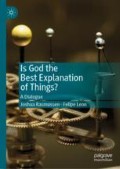Abstract
This chapter begins our inquiry into whether the foundation of existence is personal. Rasmussen seeks to uncover relevant clues. The bulk of the chapter is about four clues: (i) organized complexity, (ii) consciousness, (iii) morality, and (iv) reason. Rasmussen gives a Bayesian assessment of each of these and suggests why they independently point to a common root: intentional powers of a foundational mind. Rasmussen then adds a new, deductive argument for the same result. This argument is an extension of his argument from arbitrary limits. This deduction follows a path from (i) no arbitrary, unexplained limits, to (ii) a maximally powerful foundation, and then to (iii) a foundation with intentional powers.
Access this chapter
Tax calculation will be finalised at checkout
Purchases are for personal use only
Notes
- 1.
For more on this subject, see, for example, Wagner’s Arrival of the Fittest: Solving Evolution’s Greatest Puzzle .
- 2.
Lightman (2011), p. 3.
- 3.
Collins (2003).
- 4.
For reasons why the laws themselves are immaterial, see Jaworski (2016).
- 5.
One argument against the very possibility of awareness from non-awareness comes from the indeterminacy problem, with material configurations being unable to determine which particular thing one is thinking. See Ross (2008), Chapter 6. See also a version of my counting argument for this same problem (Rasmussen 2018).
- 6.
Thanks to Robin Collins and Ben Bavar for comments on previous drafts.
References
Collins, Robin. 2003. “God, Design, and Fine-Tuning.” In God Matters: Readings in the Philosophy of Religion, edited by R. M. Bernard, 54–65. London: Longman.
Jaworski, William. 2016. “Why Materialism Is False, and Why It Has Nothing to Do with the Mind.” Philosophy 91 (2): 183–213.
Lightman, Alan. 2011. “The Accidental Universe.” Harper’s. https://harpers.org/archive/2011/12/the-accidental-universe/.
Rasmussen, Joshua. 2018. “Against Non-reductive Physicalism.” In The Blackwell Companion to Substance Dualism, edited by Jonathan J. Loose, Angus J. L. Menuge, and J. P. Moreland, 328–339. Malden, MA: Wiley-Blackwell.
Ross, James. 2008. Thought and World: The Hidden Necessities. Notre Dame, IN: University of Notre Dame Press.
Wagner, A. 2014. Arrival of the Fittest: Solving Evolution’s Greatest Puzzle. New York: Penguin.
Author information
Authors and Affiliations
Rights and permissions
Copyright information
© 2019 The Author(s)
About this chapter
Cite this chapter
Rasmussen, J. (2019). For a Personal Foundation. In: Is God the Best Explanation of Things?. Palgrave Macmillan, Cham. https://doi.org/10.1007/978-3-030-23752-3_8
Download citation
DOI: https://doi.org/10.1007/978-3-030-23752-3_8
Published:
Publisher Name: Palgrave Macmillan, Cham
Print ISBN: 978-3-030-23751-6
Online ISBN: 978-3-030-23752-3
eBook Packages: Religion and PhilosophyPhilosophy and Religion (R0)

